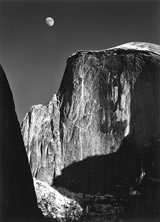Yosemite's Structure and Textures
dal 24/7/2007 al 27/10/2007
Segnalato da
24/7/2007
Yosemite's Structure and Textures
Cantor Arts Center, Stanford
Photographs by Eadweard Muybridge, Carleton Watkins, Ansel Adams, and Others. Fifty photographs plus maps, guidebooks, and stereo prints present the geological wonders of Yosemite Valley and its surrounding High Sierra peaks. The views range from Watkins's mammoth-plate prints with their stunning detail to Adams's equally detailed, but also atmospheric, images in which Yosemite's granite faces are masked by storm clouds or revealed by moonlight.

Photographs by Eadweard Muybridge, Carleton Watkins, Ansel Adams, and Others
The Cantor Arts Center at Stanford University announces the exhibition “Yosemite's Structure and Textures: Photographs by Eadweard Muybridge, Carleton Watkins, Ansel Adams, and Others,” on view from July 25 through October 28, 2007. Fifty photographs plus maps, guidebooks, and stereo prints present the geological wonders of Yosemite Valley and its surrounding High Sierra peaks.
The views range from Watkins's mammoth-plate prints with their stunning detail to Adams's equally detailed, but also atmospheric, images in which Yosemite's granite faces are masked by storm clouds or revealed by moonlight. The rapidly flowing Merced River, the plunging waterfalls and mists of Bridal Veil and Yosemite Falls, and the seemingly unchanging granite face of El Capitan are among the memorable images in this exhibition.
The inaccessible valley was home to six Indian tribes, including the Ahwahneechee and the Yosemetes. In the early 1850s the Indians were relocated and miners and prospectors began to arrive. As word spread of the Valley's wonders, photographers soon arrived; during the 1860s and 1870s, Watkins, Muybridge, and the lesser-known George Fiske, each burdened with cumbersome equipment, explored the terrain. Watkins's photographs, made on 15 x 20 inch mammoth glass plates, were sent to Washington, where their extraordinary beauty helped convince President Abraham Lincoln and Congress to undertake efforts to protect the unique landscape. In 1890, Yosemite Valley was formally declared a National Park, two years before the Sierra Club was formed. Muir's 1912 book, The Yosemite, introduced the Valley's extraordinary character to a wide audience.
The 19th-century photographs by Watkins, Muybridge, and Fiske, whose works are also presented in the exhibition, and the 20th-century images by Adams remain unrivalled as testimony to Yosemite's geological character. These photographers, who knew the Valley well, recorded it through many seasons and in all kinds of weather.
The exhibition includes early maps and guidebooks, plus many stereo views, which add another dimension to the iconic images of Yosemite's grandeur. The small stereo views offer variants of the larger scenes and also portray visitors exploring the great Sequoias.
The exhibition has been organized by Betsy G. Fryberger, Burton and Deedee McMurtry Curator of Prints and Drawings, with the assistance of Judy Dennis and Nancy Ferguson, and with Lauren Silver, associate curator for education. In addition to the museum staff, Luise Richter, from The Bill Lane Center for the Study of the North American West, contributed research. Students in John Tinker's Stanford University class in Writing and Rhetoric will make presentations on March 8, 2007 at 6 pm in the Cantor Arts Center auditorium on such related issues as environmental changes, water usage, and restricted access to the park. At least one documentary film will be shown, and a related course in Continuing Studies is planned.
The exhibition is made possible by the Halperin Exhibitions Fund, Ambassador and Mrs. "Bill" Lane, and Bill and Carolyn Reller, with additional support from L. Jay and Marjorie Rossi. Supplementary programs are supported by the Mark and Betsy Gates Fund.
Image: Ansel Adams
Related programs of film: Free, presented in Annenberg Auditorium, Cummings Art Building
Details: http://continuingstudies.stanford.edu/course/EVT177.asp
Cantor Arts Center
Stanford University 328 Lomita Drive and Museum Way - Stanford



